A report released by the Digital Media Wing (DMW) of the Ministry of Information and Broadcasting titled, ‘Anti-State Trends: Deep Analytics Report’ is deeply misleading and based on assumptions instead of facts, The Current has discovered after analysing the report.
Glaring errors and almost comical additions, the report makes a correlation between analysing hashtags on Twitter to determine if someone is anti-state and is responsible for starting trends against Pakistan.

Before analysing the report, The Current researched and spoke with analysts who are well-versed with digital analysis. There is no record of any report on hashtag analysis to determine trends at a government level in any country at any time. Pakistan is the only country that has created a report based on hashtag analysis. Worldwide, hashtag analysis is considered to be deeply unreliable since it cannot understand what is written in the tweet – it is just able to see what is being discussed.
WHAT IS THE REPORT?
The report is a compilation of hashtags that created trends that the government deems anti-state. The report shows information collected about hashtag trends and then lists pages of screenshots that show different Twitter handles sharing tweets that have the ‘anti-state’ hashtag. They do not differentiate between users and also label ‘influencers’ – people with a following who have tweeted or retweeted/replied to the hashtag.
In effect, the report seems to declare all the users in the report as anti-state, until one prominent journalist got them to add a disclaimer last night.
HOW WAS THE INFORMATION COLLECTED?
Since the whole report is based on hashtag analysis, it will be considered to be unreliable data collection and cannot be considering as a legitimate report in any institution.
When The Current reached out to General Manager of the Digital Media Wing (DMW), Imran Ghazali, he responded to the question of faulty analysis of hashtags by saying, “The purpose of this report was to ascertain factual data and to analyze social media trends that were anti-state, Data was collected after analysing Pakistan Twitter Panel from June 2019- August 2021. Those hashtags were marked for data collection where the content of tweets were planned and propagated through a network to spread anti-state trends.”
According to a source in the government, the information used is public. “Publicly released data is accurate. It’s no rocket science, anybody with a credit card can get this data. Hence made public.”
From The Current’s analysis, the data was collected by using a web application called, ‘Tweeps Map’, which is open to the public.
From our findings, the 134-page report has 85 pages that have screenshots of tweets, which means that 63.4 per cent of the report is based on screenshots of people who are using a certain hashtag that the government has identified as being anti-state. The number of tweets that are in these 85 pages amount to 666 tweets out of which 142 tweets are from three accounts, which means that 21.3 per cent of the tweets used in this study came from three people.
After further analysis of the three accounts, The Current discovered that all three accounts had a combined following of less than 11,000.
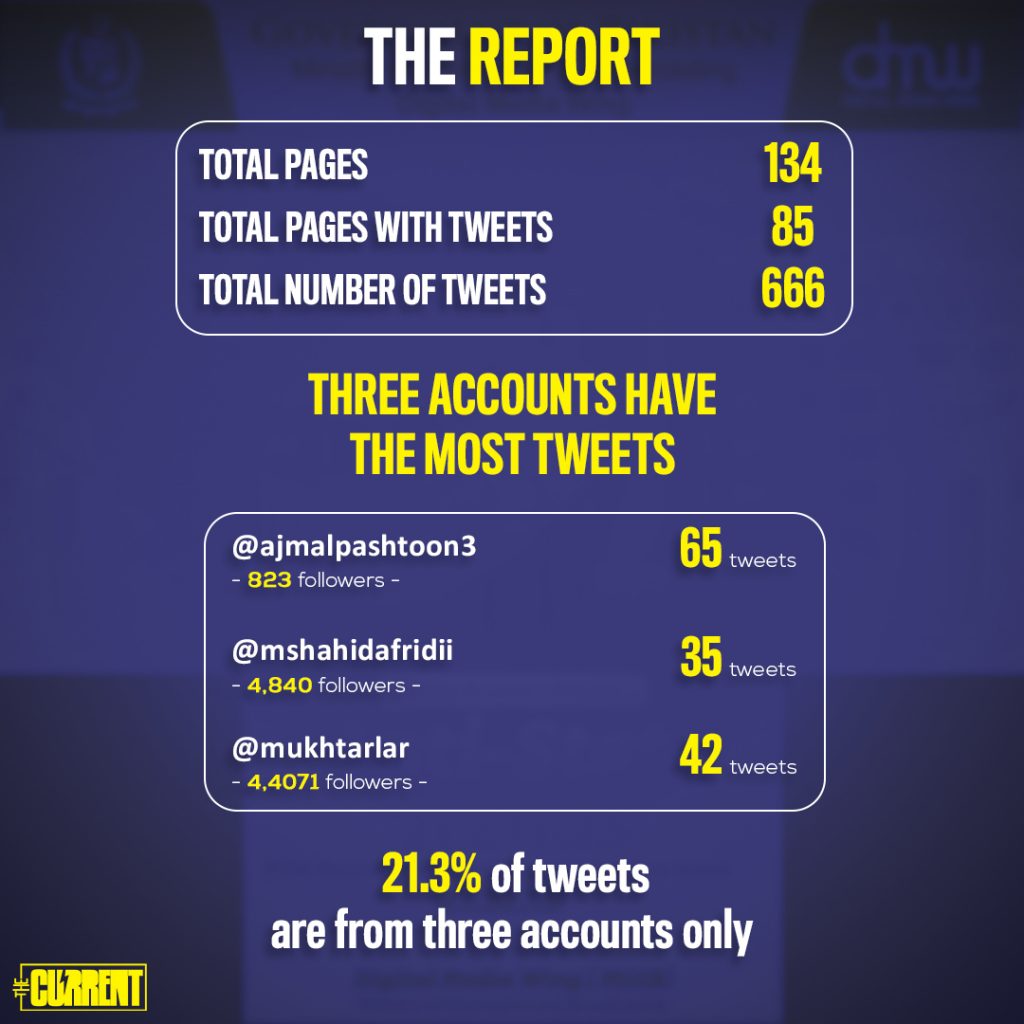
We discovered that the hashtag #SanctionPakistan was ‘analysed’ for 41 days, Pakhtun Tahafuz Movement (PTM) hashtags were clubbed together as “PTM Trends Tantamount to National Security” (the report doesn’t list which hashtags were used within this topic) and were ‘analysed’ for 22 months, #AbAwamSmashNahiHogi was ‘analysed’ for one day, and #StateKilledUsmanKakar, #IsraeliJetinPakistan, ‘JUIF Anti State Trend’, was ‘analysed’ but no time duration is given.
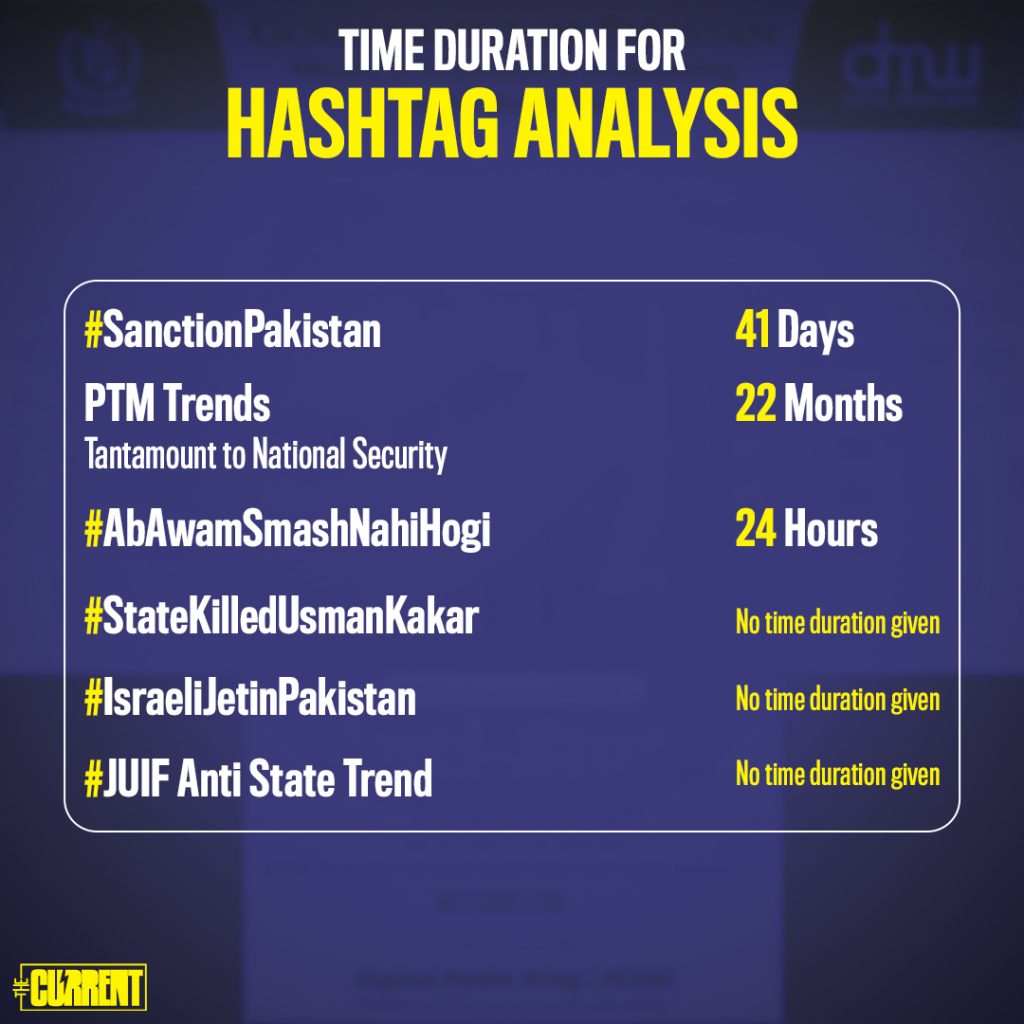
WHY AND WHEN WAS THE ‘DISCLAIMER’ ADDED?
The report was released Wednesday evening around 5:30PM and a few hours later a disclaimer was added to the report. According to journalist Fereeha Idrees, the disclaimer was added after she raised the issue with the DMW for being highlighted in the report as a ‘replies with the most followers’ account.
“I have always raised my voice against any propaganda against our state but the way the report was compiled, it made me look as one of the culprits and suddenly social media was rife with messages calling me anti-state,” Fereeha told The Current, “When I made the query, I was given the following explanation.”
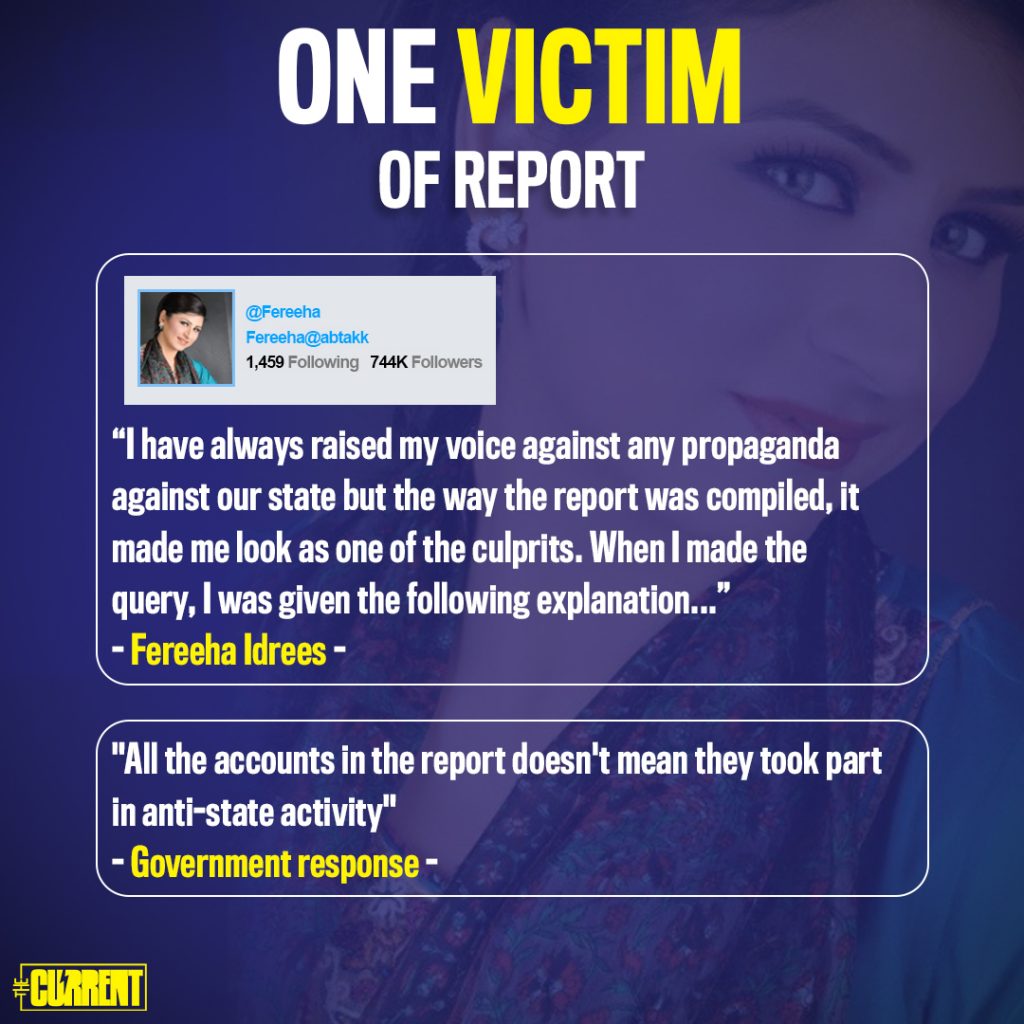
The explanation given to Fereeha by the DMW stated, “All the accounts in the report doesn’t mean they took part in the anti-state activity…It shows the whole journey of the trends/hashtags, so in this case Fareeha Idrees replied/rebutted on the Israeli related trend and that’s why it mentions ‘Replies with most mentions’ in the report.”
After the DMW response, Fereeha demanded that they add a disclaimer to the report. A disclaimer was added which stated, “If an account is listed in a report – it doesn’t always imply that the content of the tweet is Anti-State. Some accounts have engaged/replied with an anti-state hashtag to rebut. But since they used the hashtag their accounts got listed in the report.”

Imran Ghazali admitted to adding the disclaimer after Fereeha raised an objection about the fairness of the report.
The Current asked Ghazali about how they have divided the report to show which people mentioned were anti-state and which ones were considered pro-state. Ghazali refused to directly answer the question and stated, “We have not given any number for pro-state or anti-state accounts but showed below the hashtags we highlighted the accounts which contributed to a certain hashtag – tweets, top contributors, replies etc.”

When we pressed him to answer the question about how the people selected were separated into anti-state and pro-state, he said, “If an account is listed in a report – it doesn’t always imply that the content of the tweet is Anti-State. Some accounts have engaged/replied with an anti-state hashtag to rebut. But since they used the hashtag their accounts got listed in the report.”
The implication of his answers show that the report does not – and cannot- differentiate people’s points of view on a tweet, which means that someone who has posted a ‘pro-state’ tweet condemning the hashtag will also be added into the list of someone who is considered anti-state.
WAS THE GOVERNMENT ALLOWED TO USE THE APP ‘TWEEPSMAP’?
The Current reached out to TweepsMap, which was the primary analysis app used by the government for this report. The maps and information all have the Tweepsmap link on the maps and all charts in the report. We asked the CEO of TweepsMap Samir Al-Battran if they considered the analysis of the report to be authentic since it used their app service. Samir told us, “The government of Pakistan is not authorised to use our service. We will investigate how they got access to our analysis and get back to you on this.”
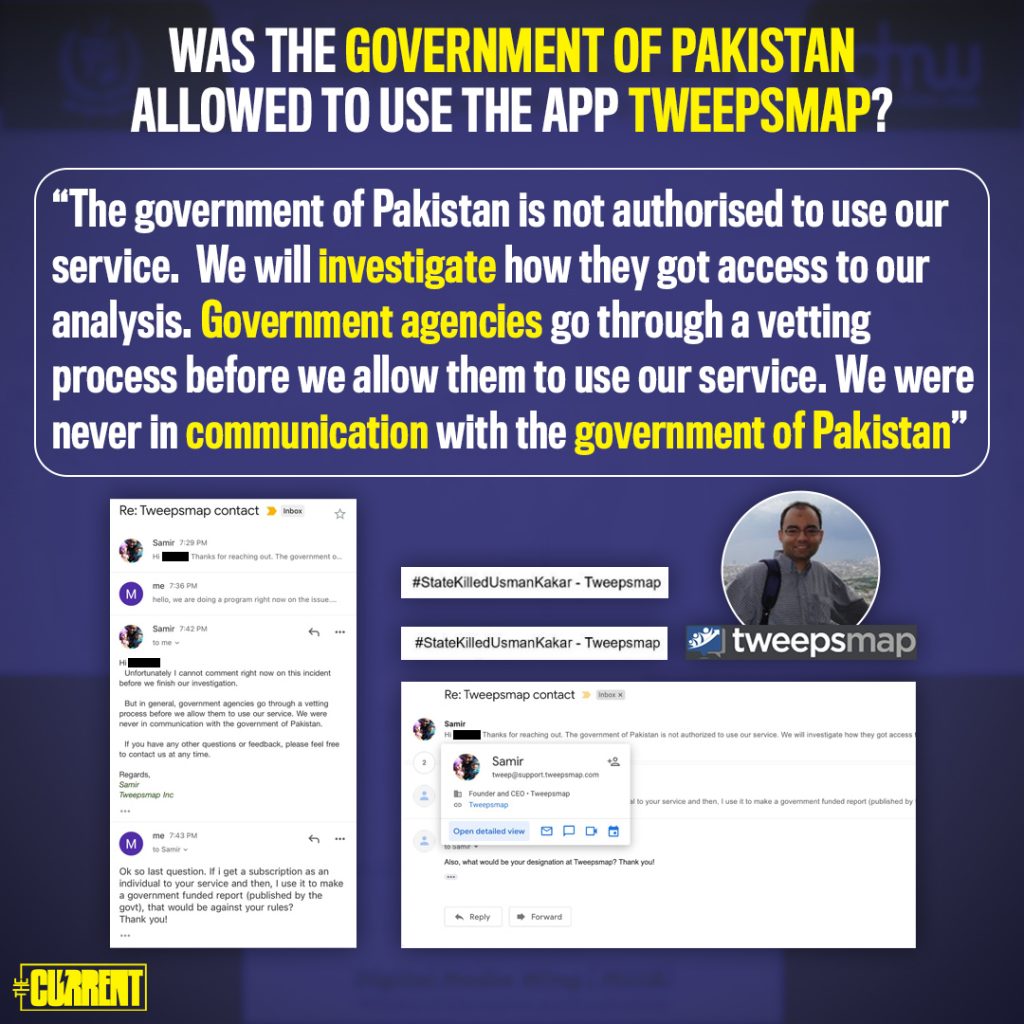
We asked him for further details, asking if an individual used their service for analysis for a government funded report, would that be against their rules, to which Samir replied and said, “…Government agencies go through a vetting process before we allow them to use our service. We were never in communication with the government of Pakistan…Yes, [using the app without informing us what it is for] would be a misrepresentation and is definitely against our rules.”
The Current asked Ghazali if they used the application and if they had authorisation to which he said, “We used different tools/APIs including our internal tools to analyse data”. We asked him since TweepsMap is the only one that is being listed in the report, if they had gotten a subscription for the government of Pakistan to which we got no response.
WHAT ELSE IS IN THE REPORT?
We analysed the tweets used in the 85 screenshots present in the report and found some comical discrepancies. One retweet had the #SajalAly hashtag along with the ‘anti-state’ hashtag ‘#AccountabilityofZarbeAzb’. We went through the Twitter account to find that the tweet mentioned in the report was a meme of Dr Firdous Ashiq Awan.
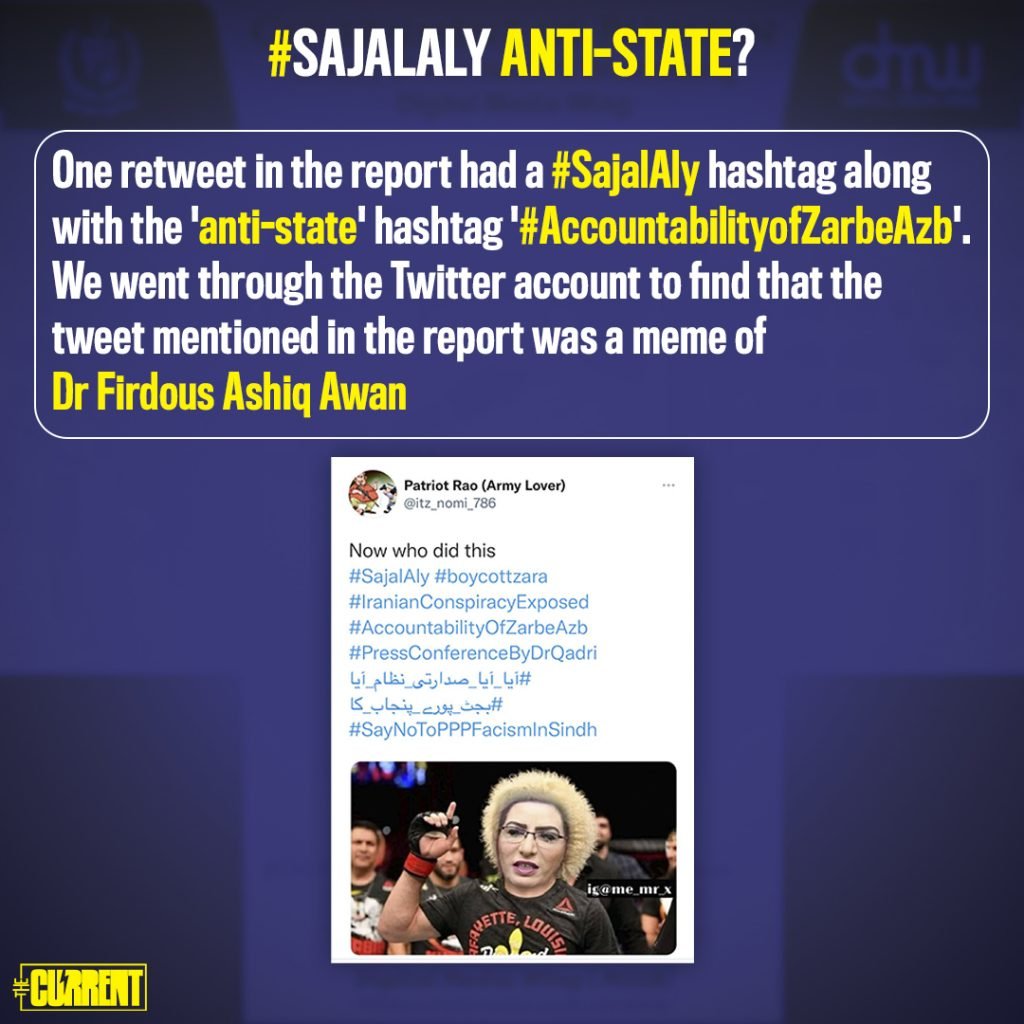
A tweet by former Interior Minister Rehman Malik is included in the #SanctionPakistan list in which he is criticising Indian Prime Minister Narendra Modi and the US.

The report also includes references to “a group of Wikipedia Admins most of whom are based in India,” giving state level credibility to an online encyclopedia that can be edited by anyone. With glaring spelling mistakes and analysis based on unauthorised data, the summary of the Digital Media Wing Deep Analysis report has been summed up by one senior data analyst based in Singapore, “That just goes to show… they don’t understand how it works.”







